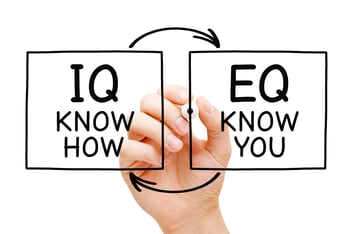No video selected
Select a video type in the sidebar.
Do you know your IQ? Maybe you’ve taken one of those online tests. A simple Google search will bring up hundreds of them. Your IQ is a measure of what you know and how quickly you can use reason to solve problems. Traditionally, things like getting good grades in school, earning a high salary, and scoring high on job performance have been linked to having a high IQ. But what about your EQ? Did you even know that you had one? While IQ is a measurement of your intelligence, EQ is a measure of your emotional intelligence. If you’ve never heard of it before, you might be thinking, “What in the heck is emotional intelligence?” If that’s the case, you’re not alone. Even people who are familiar with the term EQ probably don’t really know exactly what it means. So here’s a quick rundown:
Ideas of emotional intelligence first emerged in the 1950’s and 60’s by psychologists and researchers who believed IQ scores alone didn’t provide the full picture of cognitive abilities. But it wasn’t until the mid-90’s that the idea went mainstream and kind of took the business world by storm after publication of the best-selling book, Emotional Intelligence – Why it can matter more than IQ. The author of the book, science journalist Daniel Goleman, argued that EQ, rather than IQ, was the defining factor between great leaders and mediocre ones. Johnson & Johnson (you know, the baby shampoo people) conducted their own study after reading Goleman’s work, and concluded that "there was a strong relationship between superior performing leaders and emotional competence." So, that's a bit of history behind it, but it still leaves the question, “What in the heck is emotional intelligence?”
Psychologists Peter Salovey and John Mayer, two leading researchers in the field, define emotional intelligence as "the ability to monitor one's own and other people's emotions, to discriminate between different emotions and label them appropriately, and to use emotional information to guide thinking and behavior." In short, emotional intelligence is the ability to read, understand, and leverage not only your own emotions but the emotions of those around you. Why am I going on and on about it? Because emotional mastery, i.e., owning your emotions, is at the heart of what we do at IMS.
There is debate in the scientific community over the validity of IQ testing and whether or not it’s possible to raise your IQ score. Some scientists believe IQ is essentially fixed at an early age, that it’s based on genetics and childhood environmental factors. Others suggest that IQ can be improved through diet and exercise, reading, learning a new language, and learning to play a musical instrument. But what about EQ? Is it possible to improve your emotional intelligence, or are you stuck with the emotional patterning you were born with?
I’ve spent the last two decades developing a system of practices, strategies and techniques for mastering emotions. Today, I can confidently say that the system is tried and true. I’ve seen thousands of people transform their lives after implementing IMS training. The outcomes we experience in life are the direct results of the actions we take. And the actions we take are informed by the emotion and thought patterns that live in our nervous system. This is what I call the Inner Matrix—your unique set of emotions and thought patterns that drive your choices, decisions and actions. Those choices, decisions and actions ultimately define every aspect of your life.
Think of it like a piece of software in a computer. Left to its own devices, the software will just do what it was programmed to do. You don’t have to do anything to it, you don’t even have to acknowledge that it exists, and it will just keep on doing its thing. But if you take the time to learn computer programming, you could alter the software, rewrite it, make it do whatever you wanted it to do. Your Inner Matrix works the same way. For most of us, emotional patterns were established in early childhood, even while we were still in the womb. Some of them were embedded right into our genetic coding. And if you leave it to its own devices, your Inner Matrix will just do its thing, running the same emotion and thought patterns on an endless loop. The most common mistake I see is people trying to change what’s on the outside thinking it will make them feel better on the inside. If I drive a nicer car, or make more money, or live in a better zip code, then life will be perfect. Of course, it doesn’t work that way. If you want to achieve the outcomes you desire in life, you have to get to work on the inside first.
To begin, we need to understand where emotions come from in the first place and how they operate. As I said earlier, most of us receive our emotional programming in early childhood. If your parents struggled financially, there were probably some very specific emotions around money in the household. Today you might feel anxiety, fear, or overwhelm when it comes to issues of money and those emotions might fuel thoughts like, “It’s really hard to make money” or “Money is the root of all evil”. It’s going to be pretty tough to create a healthy relationship with money if you’ve got those kinds of thoughts and feelings running the show. But once we have an understanding of where those emotions come from, and that they weren’t really ours to begin with, we can begin to distance ourselves from ways of being that aren't serving us.
From there, we can begin building awareness of the range of emotional states we experience, and start to notice which ones we default to. By keeping an inventory of our emotional states, we can assess what isn't serving our vision for life. Then, we identify which emotions would serve our vision so we have a bullseye to aim for. We’ll never arrive at a destination if we don’t know where we’re going in the first place. From there, with a solid accounting of our emotional patterns, we can learn to recognize when we’ve slipped into a pattern that isn’t serving us and then shift that emotion into one that will. We learn how to shift an emotion. With practice and consistency, we hone that skill so that we can do it efficiently when we find ourselves in the old patterns. We learn how to train the emotions that will serve us and then we rinse and repeat until the chosen emotional states become a reflex and our new way of being.
The great news is that the tools and techniques you'll use are simple, straightforward and practical, and the system of learning and practicing them is a proven, step-by-step process. The better news is that it takes way less time to consciously train new emotional states than it took for you to master the ones you trained unconsciously for years, decades or a lifetime. And you don’t have to do it alone. When you sign up for our Power Series, you will not only have access to our full curriculum and the opportunity to work one-on-one with our certified IM Trainers, you will also be joining a community of like-minded individuals who are on the same journey. There truly is strength in numbers!
Training your emotional intelligence is like rewriting the software that’s been programmed into your nervous system. When you recognize emotional patterns that aren’t serving your vision of the life you want, you’ll be able to consciously and purposefully shift to an emotional state that does. So don’t waste any more time spinning your wheels and wondering why you aren’t getting where you want to go. Whether you’re looking to improve your health, build stronger relationships, take your career to the next level, or all three, emotional intelligence training is the key to realizing the outcomes you're aiming for. Click HERE to learn more about the Power Series and sign up today!




